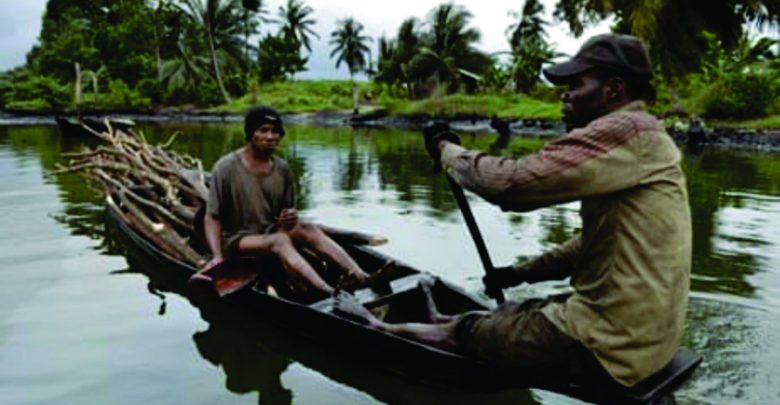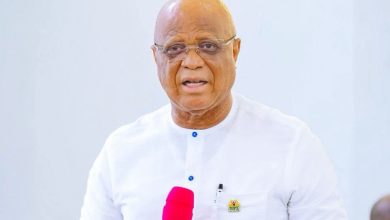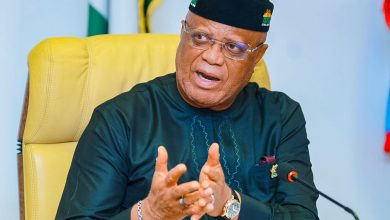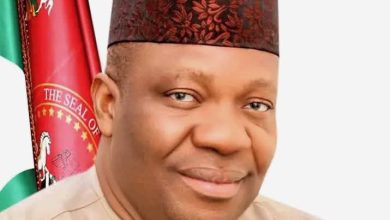Niger Delta Development Modalities Since 1950s: The Catalogue Of Nomenclature And Malfunctioning Experiments
By Substance Nature- Udo

I am saddened that for the past 40 years of Shell’s operation here, there is no school, portable drinking water nor hospital. ON behalf of the country, we apologize to you…I
personally scooped the water you drink here with my hands and it has oil in it. I can still feel the oil on my palms till now. Communities hosting a facility which generates over 2million U.S dollars per day which amounts to over N700million for the country should not be asking for primary school and health in 2019 after all these years. It is saddening.” – President Buhari, during re-opening of Oil Mining Lease (OML)-25 facility in Belema, Akuku-Toru LGA, Rivers State, Thursday, October 10, 2019.
The ideological ancestor to the endless experiments that in 2000 begotten Niger Delta Development Commission (NDDC) dates back to late 1950s following the discovery of crude oil in commercial quantity in a place called Oloibiri, in present-day Bayelsa State. The first question that therefore strikes the mind is: What specifically is Oloibiri like today with regard to its contributions to national growth and development? Is it a well-developed town in tribute to its superlative significance or it still remains the proverbial hen that lays the golden egg?
Sir Henry Willinks’ Commission holds the record of being the maiden attempt at paying back to the Niger Delta people by the Colonial Masters. Henry Willink was Vice Chancellor of Cambridge University and head of a panel commissioned on 23rd November, 1957 to look into recurrent complaints by Nigerian minorities against the domineering majorities. The panel held its sittings from 23rd November, 1957 to 12th June, 1958. A critical facet of recommendations by that nascent Commission to the Colonial administration was that the Niger Delta Region deserved special attention, especially on account of its swampy terrain that does not easily support livelihood because of the concentrated effects of surface and under-surface oil activities by International Oil Companies (IOCs).
Two years later, in a sort of cautious response to that, the Niger Delta Development Board (NDDB) was established. This was the prototype to whatever other commissions may have been constituted since then. But NDDB met its abrupt end barely six years later when the military took over the mantle of leadership of the country in 1966, under Gen. Aquiyi Ironsi, as if the armed forces did not benefit from products of oil.
By tactical extension, it cannot be debated that the agitations for creation of states in Nigeria was pioneered by the Minorities of the Niger Delta as far back as 1953, with the COR State as a launch pad. The passage of a two-third majority motion by both Houses of Parliament on 23rd March, 1962 for the creation of Mid-Western region and later creation of 12 states out of the then existing 4 regions by the Gen. Yakubu Gowon administration were partial crowning of the vociferous advocacy by the minorities for fairness and equity.
For the following 14 years of military regimes that oil exploitation activities accelerated and flourished, launching Nigeria arrogantly and wastefully on the international map of oil-producing countries and exporters, official intrigues and silence over the plight of the minorities reigned. Eventually, with the return of Civilian Rule in 1979, when Gen. Olusegun Obasanjo handed over to President Alhaji Shehu Shagari, the agitations for fairness and resource control resurfaced. The tentative consolation was the establishment of the Niger Delta Development Commission (NDDC), with a1.5% of oil revenue set aside for the purpose. Another six years elapsed before the Commission died naturally with nothing tangible to show; except stupendous wealth amassed by those who were politically privileged to administer the machinery.
With the emergence of President Ibrahim Babaginda in 1985, the revenue formula was reviewed upwards to 3%. That however came with the establishment of the Oil Mineral Producing Areas Development Commission (OMPADEC) in 1992, with Mr. Albert Korubo Horsfall as its pioneer Chairman. But OMPADEC did not last beyond fears. Gen. Sanni Abacha on assumption of office hurriedly wiped off OMPADEC on 22nd February, 1996 and established his own Petroleum Trust Fund (PTF), with Gen. Muhammadu Buhari, the incumbent president, as Chairman. This time the scope was extended to cover the whole country whether or not there was any trace of oil at some places. The fabricated National Constitutional Conference of 1994 shut up the derivation formula to 13%.
The game of name-change, without any corresponding results, did not stop there. With the return of President Olusegun Obasanjo to office a second time in 1999 as civilian president, part of his inaugural achievements was the scrapping of PTF. His own thumb-printed invention would become the Niger Delta Development Commission (NDDC) in 2000. The NDDC did not appear to have any identifiable umbrella, but was under the supervision of the Presidency. So, with winds of militancy brewing from the creeks, threatening the lifeblood of the country’s existence, late President Umaru Musa Yar’dua came up with the Ministry of Niger Delta Affairs, with late Obong Ufot Ekaette as its pioneer minister.
All these were palliatives and calculated political responses to strategically ensuring that the pipes that continuously vomit oil and gas out of the region were safe from the flying bullets of the daring militants, and by extension, a general way of assuaging the people of the region to see things through the prism of those in power who naturally believed they cannot survived a day on other grossly untapped options without oil from the Delta.
Presenting a lecture on the topic: “Economic Development, Niger Delta and the Future of Nigeria” during the 2009 Business Hallmark Inaugural Independence Anniversary, former governor of Delta State, James Ibori, in his insight into the significance and peculiarities of the Niger Delta, stated that the Niger Delta is the richest delta in the world in oil and gas reserves. “The Niger Delta is one of the 20 major deltas in the world; some of the other deltas are those in the Nile in Egypt; the Mississippi in the United States; the Mekong in Vietnam; the Ganges in India; the Yellow-Yangtse River in China; and the Danube in Germany-Romania. But the Niger Delta is perhaps the richest in the world in terms of oil and gas reserves”.
But the lingering query has been, and always has been: What has this superfluous natural endowment amounted to in the Niger Delta? Every lofty plan for the region has been a matter of paper-work and grandstand utterances with manifest administrative deficiencies, corruption, political patronage, nepotism and ultimately, underdevelopment of the area. Take for example the Niger Delta Regional Development Master Plan. According to one of the architects of that working tool, Ambassador Sam Edem, the Master Plan launched in the days of Shehu Yar’adua was designed to give holistic attention to the composite development of the area in phases. But who today patriotically and devotedly cares about its implementation since that glamorous conception?
Ironically, when President Obasanjo presented the bill proposing the establishment of the NDDC in 1999, he had a difficult time gaining general acceptance by all the lawmakers. Might the usual fears have been that too much attention shall be given to the Niger Delta of the minorities? Even more ironically, in typically mannerism and cynicism amongst Nigerians, besides the parliamentary indifference, a group under the aegis of Traditional Rulers of Oil Mineral Producing Communities of Nigeria (TROPCON), had on September 1, 2006 persuaded the national assembly to throw out the bill because it was politically motivated. Pa Edwin Clark was the arrowhead of that protest. But the bill scaled through the endemic foreboding.
The commonplace objectives of developmental plans for the Niger Delta have included compensating the communities therein that have suffered and are still suffering ecological and environmental degradation and deprivation as a result of oil activities, opening up the communities and linking them to the mainstream socio-economic growth and development in terms of infrastructure, employment opportunities, tackling ecological issues and judiciously appropriating funds meant for the area from the federal government. Change of names or nomenclature without pragmatic actions therefore cannot be the answer. Interestingly, from the 50s, all special purpose vehicles to engender rapid development of the Niger Delta have had the word, “development” as a constant feature.
If you studied closely the timeline of past and present bodies set up by Nigeria’s successive administrations since the 1960s, military or civilian, to cater specifically for the socio-economic needs of the Niger Delta, a region that has been the bread winner and envy of all, you are most likely to come to two painful summations. One, all of such bodies have shared the intrinsic characteristics of ineffectiveness, corruption, vested interest and distorted focus. Two, for as long as stakeholders in the Niger Delta choose to gamble with the opportunities at hand, so shall the Landlords in Aso Rock play along and mark time with them to the rhythm of Nigerian typical politics.
It is therefore apt we took to heart this clinical except form a World Bank Report: The Niger Delta has a history of non-performing institutions since the 1950s…States and Local Governments have also been unable to implement sustainable solutions to the region’s poverty. That failure was due in part to corruption, poor governance and lack of accountability. Communities, the supposed beneficiaries of the oil revenue allocations back to the region, have had little or no influence on the use or management of these funds. Clearly, the resources which have been available for the development of the region have not been used effectively.” Just how sad!




